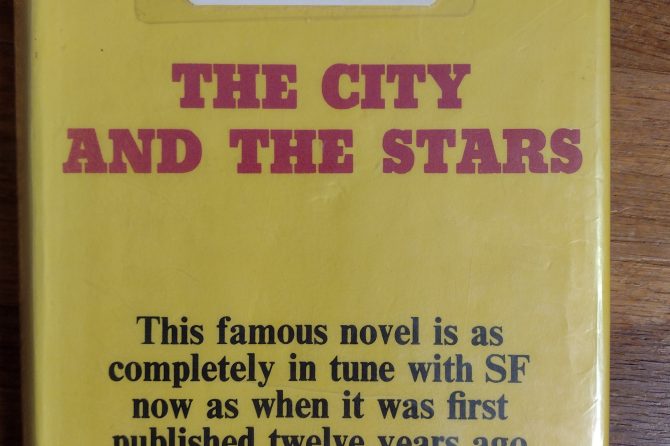 Counterfactual history is the scholarly cousin of alternate history. Instead of telling stories set in alternate timelines, counterfactual histories use what ifs to teach history. I have covered a couple counterfactual history-related books on Amazing Stories (Archduke Franz Ferdinand Lives!, Altered Pasts), but today’s subject, What Ifs of Jewish History: From Abraham to Zionism, is unique since its actually an anthology from several different authors.
Counterfactual history is the scholarly cousin of alternate history. Instead of telling stories set in alternate timelines, counterfactual histories use what ifs to teach history. I have covered a couple counterfactual history-related books on Amazing Stories (Archduke Franz Ferdinand Lives!, Altered Pasts), but today’s subject, What Ifs of Jewish History: From Abraham to Zionism, is unique since its actually an anthology from several different authors.
As the name suggests, What Ifs of Jewish History is a collection of what ifs concerning Jewish history from the Exodus to the Holocaust. It is edited by Gavriel D. Rosenfeld, who is perhaps my favorite counterfactual historian. He has written several WWII counterfactuals and runs The Counterfactual History Review, which I highly recommend you check out. Gavriel also wrote the introduction, where he showcases early examples of counterfactual thinking in Judaism, pointing out how very few Jews studied history that closely until recently.
I was honestly surprised by what I found inside What Ifs of Jewish History. I had expected a collection of straight counterfactual essays (like you would find in Robert Cowley’s What If?) and while there were many such works, there was also original works of fiction as well. Most of the fictional works were in-universe essays, alternate biographies and even a travel guide, with only one going for the traditional narrative with characters and dialogue…which wasn’t that great. All of the contributors to What Ifs of Jewish History are college professors and, as far as I know, not professional fictional writers; some can pull off fiction better than others.
Let’s look at a few of the entries that stood out for me:
“What if King Ferdinand and Queen Isabelle had not expelled the Jews of Spain in 1492?” by Jonathan Ray: In this entry, we take a look at two primary sources published by the University of Madrid Press in a timeline where Jews were not expelled from Spain in 1492. The primary sources are two letters written in the early 1670s by Joseph Benveniste, the Rabbi Mayor of Spain, a position which seems similar to the Pope for Catholics. In the first letter, he petitions the Ottoman Sultan to accept Jewish refugees from Morocco who are being persecuted there; the second is to Jewish leaders in Poland and Lithuania who are experiencing their own persecutions.
What I liked most about this work was how Ray portrayed Benveniste as not just a religious leader, but also as a skillful politician. For example, he plays down the Spanish colonies as locations for the Jews of Morocco to flee to due to the lack of faithfulness of the Jews there, yet encourages the Jews of Eastern Europe to flee there because of the wealth and prosperity they can find (while at the same time admonishing them for not following his version of Judaism). I also liked how the present day is implied to be a better era for the Jews than even in our own timeline, where western Jews live in autonomous communities throughout Europe under the guidance of the Rabbi Mayor, while Eastern Jews follow a more mystical form of Judaism. Certainly worth a read.
“What if the “Ghetto” had never been constructed?” by Bernard Dov Cooperman: In this counterfactual essay, Cooperman discusses what if the Venetian Ghetto, the neighborhood in Venice where Jews were compelled to live in 1516, was never constructed. He also talks about other locales with Jewish ghettos such Cracow, Tuscany and Rome.
I found it fascinating how Cooperman critiqued the accepted belief about the ghettos: that they were a sign of religious discrimination by the majority Christians. For example, he points out that the Venetian Ghetto was created to house Jewish refugees, which was a big deal for a city that before this had never allowed Jews to live within its confines. Thus, the ghetto allowed Jews access to a market they had previously been denied. While Cooper admits that religious discrimination did play a part, he points out that ghettos were often formed out of the efforts by municipal leaders and their residents to find a way for a diverse population to live together in a confined space.
Although it may be a tad controversial, you really should check this essay out.
“What if Russian Jewry had never been confined to the Pale of Jewish Settlement?” by Jeffrey Veidlinger: In this essay. Veidlinger presents two different scenarios regarding whether the Pale of Settlement, the western region of Russia from the late 18th to early 20th century where Jews were only allowed to reside, was never created . Much like the last essay I covered, Veidlinger makes an argument as to why the Pale was actually a good thing for the Jewish people by presenting two counterfactuals without it.
In the first scenario, Poland maintains its independence in the 1790s thanks to the help of Jewish volunteers who intervened in a crucial battle. The thankful Poles confirm Jewish autonomy within Poland and establish reservations for them in their western territories. These reservations, however, tend to be poor and backward places where alcoholism is rampant and casinos are plentiful. Meanwhile, the Polish population have co-opted many Jewish symbols, especially for their sports teams. In the other scenario, Russia decides to make a concentrated effort to convert Jews in their newly conquered Polish territories and are successful. Eventually the Jewish religion ceases to exist within Russia, but the descendants of the Jews are highly successful Russians, zealot followers of the Russian Orthodox Church.
Although both scenarios are pretty extreme, they are attempts by Veidlinger to show that the Pale helped preserve the Jewish religion, while allowing Jews to succeed in business and politics. Granted he was pretty heavy handed with his parallels with Native America reservations in America with the first scenario. Even if something similar could happen in a Poland that preserved its independence, I thought he went a bit to far. Oh well, still worth a read.
“What if a Christian state had been established in modern Palestine?” by Derek Jonathan Penslar: This was perhaps my favorite counterfactual essay in this collection. In it, Penslar questions whether its fair to compare Israel to apartheid South Africa. To make his argument, he crafts a scenario around the Templers, who are a group of German Christians who settled Palestine. Having never heard of these people before, I was immediately hooked by this obscure bit of history.
Anywho, in Penslar’s scenario, Germany wins World War I and the Templer communities grow in Ottoman Palestine. Following a second world war that Germany narrowly wins, the Ottoman Empire collapses and the Templers establish a new state called “New Israel”. Being a protestant Christian state, it initially gets the backing of the United States, especially to combat the growing influence of the Soviet Union. New Israel, however, soon becomes a pariah state, especially due to their discimination of Arabs within their border. Eventually the state of New Israel reforms itself and allows the majority Arabs a voice in the government.
Through this scenario, Penslar argues that Israel shouldn’t be compared to settler states like South Africa and New Israel, who are made up of immigrants looking for a new homeland and have the perverse belief that they can take better care of it then the current inhabitants. Israelis, he argues, are motivated by a shared religious/ideological reason and see Israel as not a new homeland, but the homeland that they are finally returning to. Its hard to give Penslar’s argument justice, so I recommend just reading it.
“What if the Jewish State had been established in East Africa” by Adam Rovner: This was perhaps the most imaginative entry in this collection. Through a travel guide we learn about the history of New Judea, a Jewish majority state in our timeline’s Kenya founded by Zionists who took up the British offer to settle in Africa in the late 19th century.
The story is a fascinating look at the weird state of New Judea, from its earliest beginnings as a small colony in the African interior to a major regional power in East Africa. Although New Judea’s relations with its neighbors does mirror the current Arab-Israeli conflict, in general things aren’t as bad. In fact, the existence of a Jewish state this early helps save the Jews who would have been killed by the Germans in WWII. In a strange partnership, the radical leader of New Israel works against the Allies by trading resources to the Germans in exchange for Jewish lives.
Granted that last bit does strain plausibility a bit. Such a divergence could have butterflied away many of the events and people of the first half of the 20th century. That said, Rovner’s contribution is an excellent piece of world-building, especially since he took the time to look at the social history of New Judea and not just the political history. Check it out if you like building alternate nations.
“What If the Weimar Republic Had Survived?: A Chapter From Walther Rathenau’s Memoir” by Michael Brenner: This is another fictional entry from the memoirs of Walther Rathenau. In our history, Rathenau was a Jewish German statesman in the post-war Weimar Republic. He was assassinated by a right wing terrorist, but in this alternate timeline, he survives, setting off a backlash in Germany against right wing politics. Thus political parties like the Nazis never come to power and democracy in Germany survives.
Rathenau eventually becomes president of Germany and even assists in the creation of a Jewish state in the Middle East (which he convinces Albert Einstein to become president of) without any conflict with its Arab neighbors. This world, however, isn’t a perfect place. Many Jews face persecution in the Soviet Union and, due to to fear they might be drawn into a war with the Soviets, America too experiences a rise of antisemitism.
The Weimar Republic is one of those periods of history where, if it actually succeeded, people can imagine the world being a better place. Sadly it didn’t succeed and we are left with the timeline we do inhabit. Nevertheless, Brenner’s contribution is at least a reminder that we can still be better going forward.
“What if the Final Solution had been completed?: Nazi memory in a victorious Reich” by Dirk Rupnow: Now we come to the most terrifying entry in What Ifs of Jewish History. In this essay, Rupnow showcases the surprising attempts by Nazi Germany to actually preserve Jewish culture, while at the same time trying to eradicate Jews from the face of the Earth. If the Nazis had been victorious and their Final Solution carried out, Judaism would still be preserved thanks to Jewish museums, Jewish Studies classes in German universities and, perhaps the most mind-boggling action of them all, surviving Jews to serve as an example to a new generation of Germans.
Rupnow argues that Nazism needed the “other”. The outsider who is essentially at fault for everything that goes wrong in society. Without them, people would blame the government and no politician, regardless of ideology, wants that. Thus even if the Final Solution had been carried out, people would need reminders of their enemy.
This essay really did remind me of how insane Nazism was, and you wouldn’t think an ideology that led to the direct deaths of five million civilians would need any reminders of how awful it was. So if you want a horrifying look into the psyche of a monstrous regime, this is the essay you need to read.
Since this review is getting on the long side, let me end by saying What Ifs of Jewish History as a whole earns my recommendation. Its writing is not as dense as other counterfactual tomes I have come across and its fictional entries mean that is accessible to a casual historian. Go check it out and learn a thing or two about Jewish history by visiting some different Earths.










Recent Comments